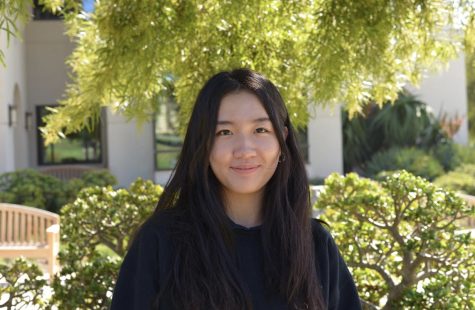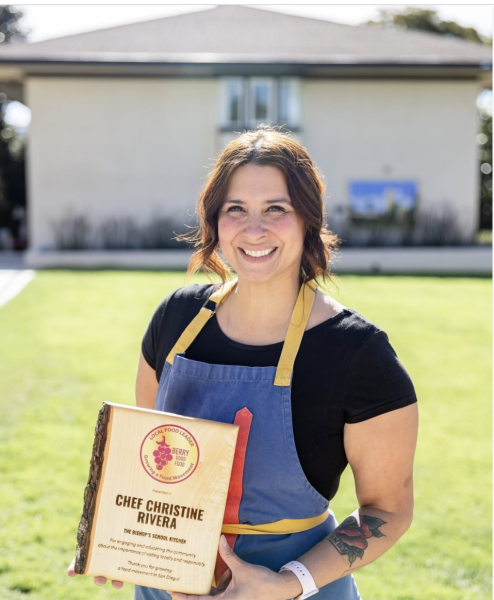Ready, Set, Write
Applying to Honors English classes has changed
“[Timed writing] is not a perfect way to judge a student’s work, but among the choices available to us, it felt like the most accurate and equitable,” said English department chair Dr. Anna Clark.
“I think ‘new’ often feels scary,” said English Teacher and Department Chair Dr. Anna Clark. Though February and March are still considered early months of this year, for many Bishop’s students, this is the time when many departments roll out fixed requirements and procedures for honors applications. This year, there’s a notable change in the Honors English application process: a new timed writing assessment.
This year’s selections are based on a handwritten, 45-minute timed essay for sophomores and juniors applying to the Honors Writing and Honors American Literature courses. For juniors applying to Advanced Honors English, they must also submit one creative writing piece and one analytical essay from a recent English course. Furthermore, a student’s performance in past English classes also factors into the decision.
In an email to the class of 2023 and 2024 on February 1, Dr. Clark outlined the specific changes to the application process accompanied by a section titled “Rationale and Other Useful Info.” In addition to establishing the role of timed writing, this informational announcement also became a space to preemptively answer certain questions.
“This has been an ongoing discussion in the department… it’s something that we started talking about last spring,” Dr. Clark said. “We, in our decision-making process, found that the writing samples that formed the basis of our evaluations were pretty widely varied; it was, in some cases, difficult to compare them.” This was in reference to last year’s honors application process, based on prepared student pieces instead of the element of timed writing. However, years ago, timed writing was, in fact, a portion of the application. “We switched to processed papers in order to communicate our belief in the importance of revision, a belief we still dearly hold,” explained English teacher Mr. Adam Davis. “But this brought challenges of its own as it is sometimes the case that these papers have not only been processed by the student, but by peers, parents, and tutors.”
Some students, having gone through a different version of the honors application process in previous years, noted their personal feelings about this change. “Personally, whenever I had timed writing assignments in the past, those were my worst assessments, because I get anxious during them, and it really affects my performance,” Natasha Mar (‘23) described. “At least last year, I was pretty proud of the work that I submitted. But this year, I wouldn’t feel as confident [applying to the honors courses].” Elise Watson (‘22) said, “I don’t believe in applications for anything… but I completely understand why [these changes were implemented],” She paused. “Writing is one of those things that, of course, you still get better over time, but there are a few moments that your writing really might stand out two years before you submit this application, but it should really be about the work you are doing [currently] in class.”
Recognizing that there may be contrasting experiences across grade levels, Stanley Wei (‘22) said, “If I were to apply again, and there was this change, I think as someone who had gone through a lot of timed writing experience outside of school, that’s something I would be alright with.” Renee Wang (‘24) noted that her English II class has had one timed writing experience in class, which was during quarter three. Looking at his Whipple Hill assignments, Kenan Begovic (‘24) counted more than ten timed writing assignments so far in this school year. These were some of the many varied experiences across different tenth-grade English classes.
Other students found the change fair. “When I heard of the changes, I was immediately grateful that I was graduating—I haven’t met a student who genuinely loves timed writing,” Tanvi Ghosh (‘22) remarked. “However, after Dr. Clark explained the reasoning behind the new application… I think this process, while we don’t love it, makes complete sense.” Besides the goal of ensuring fairness, Tanvi expressed that each course and teacher may have varying assignments. Looking back to her experience discussing English II with her friends, Tanvi added that some classes may not have written a formal creative writing piece, or some may not have written a full analytical paper—making an application with solely prepared works unproductive.
The popularity of such discussions begs the question: what are the differences between English electives and honors courses, and what drives students to take either?
From a technical standpoint, though all of the English courses in junior and senior year offer a rigorous, writing-focused experience, the difference with honors class is the amount of time—an hour and a half to be exact—that teachers ask students to put into that work. “Because [honors courses] allow us to assign someone more homework, it allows us to read somewhat longer texts in addition to increasing the number of reading assignments that we typically offer,” Dr. Clark explained.
Additionally, many juniors and seniors voiced that, for them, the honors program emulates the curricula of English I and II more than the sharpened focus of electives. “Honors classes seem much more ‘standard’ comparatively—it feels more straightforward to enroll in a yearlong course,” Eli Browne (‘23) said. “In electives, you’re allowed to go into a very niche understanding,” noted Elise, who took two electives in her junior year.
However, the appeal of grade-wise advantages, especially in the academically-driven environment of Bishop’s, is indisputable, which many acknowledge. “[This phenomenon] is a shame as our electives are just as rigorous and far more unique—they offer Bishop’s students an opportunity typically reserved for college English majors,” Mr. Davis explained. Marianna Pecora (‘22), though understanding the ambition of adding more weighted classes to transcripts, argued that these classes allowed her to “dive deeper into specific genres,” referring to her experience in both the Creative Nonfiction and Epic Epics electives.
Wanting to ensure that students did not feel any additional pressure, Dr. Clark reiterated that the department is not expecting timed writing pieces to look like fully polished pieces. “We went back and forth on options for a kind of standardized assignment… because we wanted to make sure that students were writing under the same conditions and not receiving outside help,” she said. “[Timed writing] is not a perfect way to judge a student’s work, but among the choices available to us, it felt like the most accurate and equitable.” To prevent an over-reliance on parents, tutors, or online resources such as SparkNotes for these written submissions, the English department decided upon this element.
“I do really feel for the English teachers who have to make these decisions about who to accept into honors English courses,” said Ashley Sottosanti (‘22). “Writing and performance in English classes, in general, is so subjective, it’s hard to create a system where every student can be judged equally.”
Dr. Clark also noted that timed writing is something that many students already practice frequently in class, they just don’t necessarily see it as such. “So, anytime you’re in a class, and the teacher says, ‘write for 20 minutes,’ that’s a limited amount of time, right?” She wanted students to understand that this change is actually just reflective of something that is already happening in a less formal way in our classes.
Again, the English department emphasizes that perfection isn’t the goal for this portion of the application. “While style matters, what we’re really interested in is seeing how students think on the page,” Mr. Davis explained. “This should provide a valuable window into how students respond to literature in the moment.”
Though the former requires an additional application procedure, both honors and elective English classes offer endless opportunities and support for our student body. “The best thing you could do is put your best foot forward,” Tanvi said. Dr. Clark added, “If they are doing their work in their current English class and reading attentively and practicing their writing skills, they’re doing everything they need to prepare.” Although the changes made to the Honors English applications for the 2022-2023 school year garnered much discussion, both students and faculty look forward to achieving goals laid out for extended fairness and passion for English.

Crystal Li joined The Tower in her freshman year when she moved from Shanghai to San Diego in 2019. Now a senior, she fondly looks back on the four-year...


![“[Timed writing] is not a perfect way to judge a student’s work, but among the choices available to us, it felt like the most accurate and equitable," said English department chair Dr. Anna Clark.](https://thebishopstower.com/wp-content/uploads/2022/04/IMG_0449-900x900.png)



